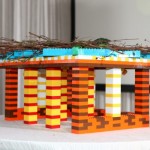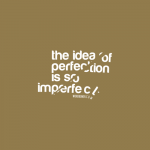A friend once taught me a powerful saying: “The Perfect is the enemy of the good.” This pithy piece of wisdoms speaks to those of us who worry about everything. When everything has to be perfect, we dwell on each detail and never get anything done.
In preparing of the upcoming Jewish holiday of Sukkot, I realized this saying also contains a deeper pearl of wisdom. Sukkot is a holiday in which we build a temporary outdoor dwelling place called a succah, and eat and celebrate and welcome guests into it for seven days. Jewish tradition has and extensive set of instructions detailing the way in which a succah is to be constructed.
Yet, the laws for building a succah have an unusual caveat. An imperfect succah is still a “kosher” succah. Even if the walls are not the right length, or the door is not in the proper place, we can still use the succah in the same way we would use a perfectly constructed succah. (Personally, I am grateful for this exception, because my handyman and building construction skills leave much to be desired!)
Even if the walls are not the right length, or the door is not in the proper place, we can still use the succah in the same way we would use a perfectly constructed succah. (Personally, I am grateful for this exception, because my handyman and building construction skills leave much to be desired!)
Peace Needs Flexibility
This kind of exception is rare in Jewish law. Usually, an item used in Jewish ritual needs to be perfect. A Torah scroll, for example, is meticulously written and rewritten until every letter precisely formed. The number of tassels on a Jewish prayer shawl is non-negotiable. A sukkah, however, even without any of the necessary decorations, can still be used for ritual purposes.
This flexibility is the reason the Jewish sages consistently refer to the “Sukkat Shalom, the Dwelling Place of Peace.” Peace demands flexibility. Is any relationship always perfect for both partners? Is any business deal absolutely perfect for both parties?
Perfection is not only the enemy of the good. If we insist on perfection, we will always focus on what’s wrong rather than what’s right. As Rabbi Avraham Kook, one of the great mystics of the twentieth century put it, “peace can never exist when we insist on perfection.”


